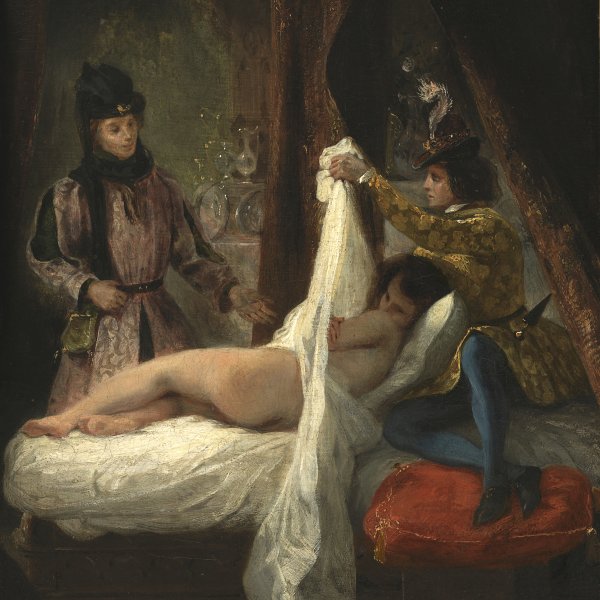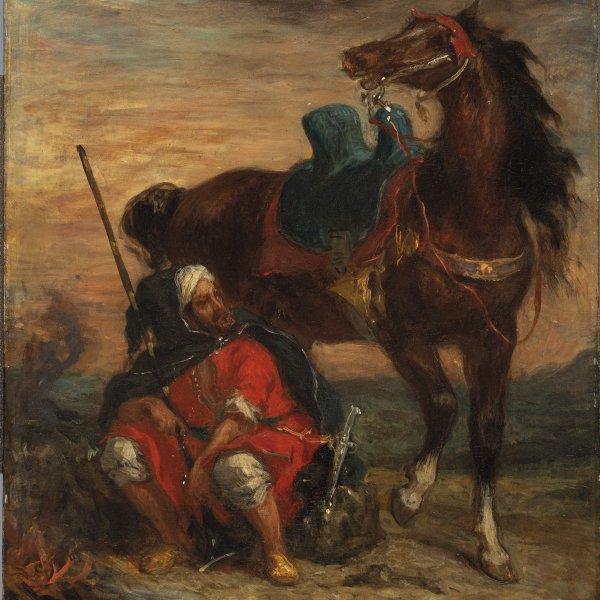Eugène Delacroix
Charenton-Saint-Maurice, 1798-Paris, 1863
Son of the politician Charles Delacroix and of Victoire Oeben, daughter of the famous cabinet-maker, Eugène grew up in a cultured, refined environment, surrounded by family members and influential friends. Delacroix’s artistic studies began in 1815 in the studio of Pierre Guérin, where he briefly coincided with Géricault, for whom he always expressed great admiration. Shortly afterwards Delacroix entered the Academy of Fine Arts. During these years he regularly visited the Louvre where he copied works by Raphael, Titian, Veronese and Rubens. In 1819 he received his first commission to paint a Virgin and Child for the church of Orcemont in Paris. In 1822 Delacroix exhibited for the first time at the Salon, where he continued to exhibit until 1859. His chosen work, The Barque of Dante (Musée du Louvre), was extremely well received and placed the artist among the leading figures of Romantic painting. In 1825 he travelled to England where he became familiar with English art collections and the work of Byron and Scott, also attending performances of Shakespeare and of Goethe’s Faust. Delacroix’s painting Greece on the Ruins of Missolonghi (Musée des Beaux-Arts, Bordeaux), on the subject of the Greek war of independence, is a tribute to Byron.
At the 1831 Salon Delacroix presented his famous Liberty leading the People (Musée du Louvre, Paris), an allegorical representation of the July 1830 Revolution. Again, the painting caused a sensation. From January to July 1832 the artist was part of a delegation sent by the French government to the Sultan of Morocco. During the trip, which also included Spain and Algeria, Delacroix produced numerous sketches and notes that he used for later compositions.
Delacroix devoted his mature phase to decorative schemes. In 1834 he received his first commission of this type, to decorate the Salle du Roi in the Bourbon palace in Paris, now the National Assembly. From 1850 he focused on the execution of mural paintings for the Hôtel du Ville and the Chapel of the Angels in Saint-Sulpice, both in Paris. Chronic laryngitis obliged him to spend lengthy periods away from Paris throughout his life, interrupting his professional activities.
At the 1831 Salon Delacroix presented his famous Liberty leading the People (Musée du Louvre, Paris), an allegorical representation of the July 1830 Revolution. Again, the painting caused a sensation. From January to July 1832 the artist was part of a delegation sent by the French government to the Sultan of Morocco. During the trip, which also included Spain and Algeria, Delacroix produced numerous sketches and notes that he used for later compositions.
Delacroix devoted his mature phase to decorative schemes. In 1834 he received his first commission of this type, to decorate the Salle du Roi in the Bourbon palace in Paris, now the National Assembly. From 1850 he focused on the execution of mural paintings for the Hôtel du Ville and the Chapel of the Angels in Saint-Sulpice, both in Paris. Chronic laryngitis obliged him to spend lengthy periods away from Paris throughout his life, interrupting his professional activities.






